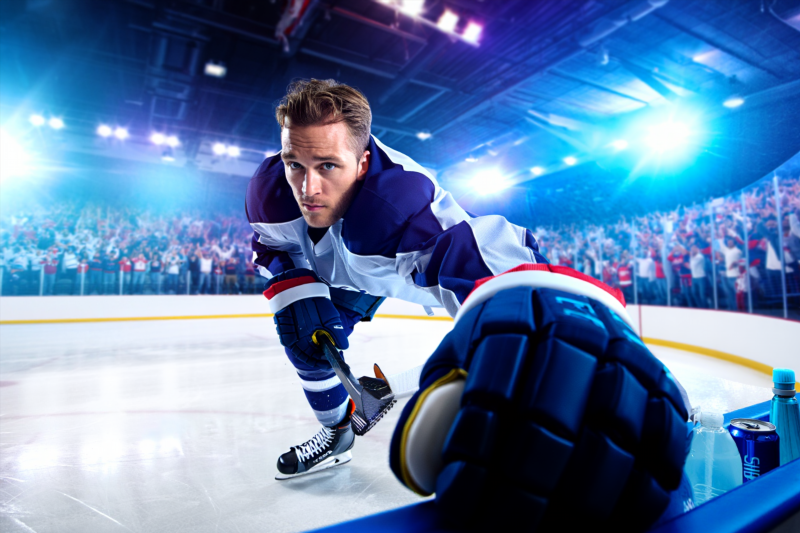
Hockey Nutrition Tips to Maximize Energy and Speed Recovery
Hockey is an intense, fast-paced sport demanding peak physical performance, endurance, and quick recovery. Whether you’re a professional player, a dedicated amateur, or a passionate fan involved in local leagues, understanding the essentials of hockey nutrition is crucial. Proper fueling strategies help boost energy levels during grueling games and practices, while effective recovery protocols ensure you’re ready to hit the ice again. This comprehensive guide offers expert tips on hockey nutrition designed to optimize athletic performance, enhance speed, and accelerate recovery.
Why Nutrition is Critical for Hockey Players
Hockey athletes face high demands:
- High-intensity intermittent activity
- Repeated sprints and quick directional changes
- Extended periods of exertion with minimal rest
Proper nutrition directly impacts:
- Energy availability
- Muscle repair and growth
- Immune function
- Injury prevention
Understanding the right fueling and recovery strategies is essential for staying competitive.
Key Principles of Hockey Nutrition
1. Prioritize Carbohydrates for Energy
Carbohydrates are the primary fuel source for hockey players. They replenish glycogen stores in muscles, supporting sustained high-intensity efforts.
- Sources: Whole grains, fruits, vegetables, dairy
- Intake Timing: Focus on carbohydrate-rich meals 3-4 hours before play, and consume easily digestible carbs 30-60 minutes prior if needed.
2. Incorporate Adequate Protein for Recovery
Protein aids muscle repair and helps prevent soreness after intense sessions.
- Sources: Lean meats, eggs, dairy, legumes, plant-based proteins
- Intake Timing: Aim for protein-rich foods within 30 minutes to 2 hours post-exercise to maximize muscle synthesis.
3. Hydration: The Unsung Hero
Dehydration impairs performance and prolongs recovery.
- Strategies: Drink water consistently throughout the day; during activity, consume electrolyte-replenishing beverages when exertion exceeds 60 minutes.
- Signs of Dehydration: Thirst, dark urine, fatigue
4. Fat Intake for Long-Lasting Energy
Healthy fats provide sustained energy and support cellular function.
- Sources: Nuts, seeds, avocados, olive oil, fatty fish
- Tip: Balance fat consumption to avoid sluggishness, particularly around intense training sessions.
Performance and Recovery Food Tips
| Timing | Nutrition Focus | Food Suggestions | Why It Helps |
| Pre-Game (3-4 hours) | Carbohydrates + moderate protein | Whole grain pasta, chicken, vegetables | Top off glycogen stores and promote sustained energy |
| On the Ice (if needed) | Quick carbs | Banana, energy gels | Immediate energy boost |
| Post-Game (within 2 hours) | Protein + carbs + hydration | Protein shake, rice, fruit, water | Muscle recovery and glycogen replenishment |
| Rest Days | Balanced meals with focus on recovery | Salmon, sweet potatoes, leafy greens | Support overall recovery and immune health |
Supplements for Hockey Performance
While whole foods should be the foundation, certain supplements can support energy and recovery:
- Creatine: Enhances strength and power
- Branched-chain amino acids (BCAAs): Aid muscle repair
- Electrolyte drinks: Maintain hydration during intense play
- Vitamin D and Omega-3s: Support immune health and reduce inflammation
Note: Always consult with a healthcare professional before starting any supplement regimen.
Practical Strategies for Optimal Nutrition
Plan Your Meals and Snacks
Preparation is key. Schedule meals around training times, ensuring access to nutrient-dense options.
Stay Consistent
Consistent nutrition sustains energy levels and ensures rapid recovery.
Use Recovery Protocols
- Active Recovery: Light skating, stretching the day after intense games
- Rest: Prioritize sleep to support muscle repair and mental clarity
- Foam Rolling and Massage: Reduce soreness and improve mobility
Adjust Based on Individual Needs
Nutrition needs vary based on age, position, activity level, and personal health. Tailor your diet accordingly.
FAQ: Hockey Nutrition for Athletes
How much should I eat before a game?
Aim for a meal rich in complex carbs and moderate protein about 3-4 hours before play. Examples include whole grain pasta with lean meat or a rice bowl with vegetables.
What should I eat immediately after a game?
Focus on quick-digesting carbs and high-quality protein to replenish glycogen stores and support muscle repair. A protein smoothie with fruit or a sandwich with lean meat works well.
How can I stay hydrated during long games or practices?
Drink water regularly and include electrolyte drinks if activity exceeds 60 minutes or in hot environments.
Are energy drinks good for hockey players?
Use energy drinks sparingly; choose those low in sugar and high in electrolytes to avoid crashes.
Optimizing hockey nutrition is a proven strategy to enhance performance and hasten recovery. By focusing on the right balance of carbohydrates, proteins, healthy fats, and hydration, players can elevate their game, reduce injury risk, and stay competitive. Remember, nutrition is not just about what you eat—it’s about fueling your passion for hockey with purpose and precision.
Get on the ice with confidence — fuel your game and recover faster with expert-backed nutrition tips. Want personalized advice or meal plans? Contact our sports nutrition specialists today!